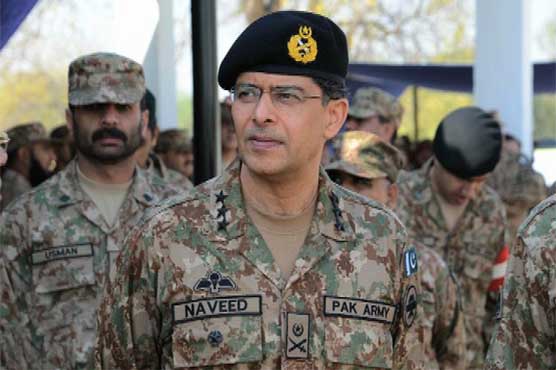Corps Commander Naveed Mukhtar earlier today said that “all stakeholders of Karachi must shun vested interests and expediencies and put an end to militant wings and mafias to restore sustainable peace and development in the metropolis. “
Speaking at a seminar hosted by the National Defence University in Karachi, the corps commander said that ethnic, political and sectarian harmony should be bridged with foresight and (by) listening to each other’s grievances.
“A formulation of reconciliation commission would be a good step forward,” he suggested.
He said that the surge in ongoing law enforcement operations and rangers operations in Karachi continues national and provincial action plans aimed at flushing out terrorists, criminals and gangs, making civil machinery more effective and creating an environment for sustainable development.
“We are after terrorists, we are after target killers, we are after kidnappers, and we are after extortionists, and that is the mandate given to us. These operations are apolitical and across the board, and we are trying our best to get it done according to the law of the land. There will be no tricks and practicalities.”
Police and administration need to be liberated from interference and influence, he said.
“During the last two months, lots of operations have been conducted against TTP and Al Qaeda, Lyari gangsters, sectarian and political criminals and other criminals.”
The ongoing operations have improved the law and order situation, and the general public has breathed relief. Terrorism, extortion, target killing, and crimes have been reduced considerably, he said.
“Due to vested interests, some political expediencies, sponsored militancy, patronage of vested interests, ethnic, political, and sectarian disharmony, effects are fluctuating. However, there is a downward trend in all categories of crimes.”
“We still have to go a long way, and Inshahullah, we will go. All criminals, their facilitators, and their networks are being challenged.”
He said: “We are doing our best to ensure prosecution of terrorists and criminals. There is also an urgent requirement to go after white-collar crimes and sever their linkages with criminality.”
“We should be mindful that terrorists are trying to regroup but will not let our efforts get scattered. There will be no compromise; God willing, we will unfold them layer by layer.
“We are determined to eliminate all types of terrorists, criminals and their facilitators from Karachi. We want to strengthen administration and police to take the lead role, which is the most important thing.
Also read: Corps Commander Karachi, DG rangers tour gang war infested Lyari .
He said that due to the depth of great challenges, the business-as-usual approach will have to be changed, and this approach will not work.
“Karachi’s problems are generally a result of ethnic and sectarian rivalry. Special interest groups, mafias, and criminals compete for power, resources, and survival. Over time, the land order situation in Karachi has suffered from a series of failures and errors, including administrative incompetence and political dysfunction.
“Some of these errors can and should be corrected. The order has revived, and power in Karachi has been defused across the greater numbers and rangers of actors. The net result is that while the government remains in power, its influence diminishes.
He said, “We have done enough talking about that; our actions need to be translated into meaningful, effective, and coordinated responses. “
Karachi is a megacity and home to a multi-ethnic population of estimated 23 million people. This city is also called the engine of Pakistan, contributing 65 per cent of national revenue. It is also the commercial capital of Pakistan. It also contributed more than 35 per cent of the country’s total GDP.
Karachi, besides being the nerve centre of Pakistan’s economic activity, is also called mini Pakistan for its stunning ethnic diversity.
“Unfortunately, it has been the victim of ethnic violence since the 1980s. Due to constant unrest, it has negatively affected Pakistan’s fragile economy and perception.
“Over the last three decades, Karachi has slipped from a vibrant city into a violence-prone urban center. Karachi is growing at an incredible pace. Each year, two to three thousand people join the city from within and outside the country.”
Unfortunately, authorities responsible for governance and administration have failed to provide the necessary infrastructure and services. Resultantly, slum areas mushroomed in most parts of the city. This institutional vacuum, which was created, was filled by criminals and special interest groups, whether ethnic, criminal or sectarian.
Due to a lack of basic services, people turned to these syndicates for assistance and protection, which resulted in booming land-grabbing businesses and lucrative but illegal delivery of services like water and tanker mafias.
Competition for control of these resources by mafias and interest groups has also paved the way for the smallest drug paddlers to Al Qaeda groups.
Crime has transformed into terrorism and militancy. In Karachi, there is a perpetual tension between forces of order and disorder and the balance between them defines the law and order situation in the city at a particular time. This balance, to a variant degree, can also be affected by national, global and regional trends that create interest for the actors.
“More needs to be done to foster partnership for peace. In Karachi, the sheer number and volume of stakes and divergent views make consensus difficult or impossible, ” he remarked.
“Sometimes, stakeholders who have to fix it just disagree on what needs to be done and what they are prepared to sacrifice to achieve the goal, or they are reluctant to support the initiative for fear of setting a precedent that can be used against them later.
“Can we leave it unattended, hoping that prevailing problems will disappear or resolve themselves? The answer is a big No. Inaction on our end or failure to make wiser and constructive choices will only make the situation worse. Therefore, some steps should be taken. The construct of effective response has to be apolitical.” he finished.






